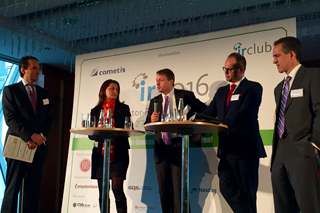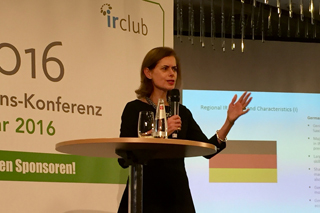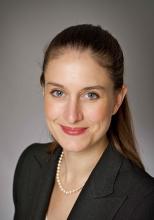IR Magazine reports from the IR Club’s annual conference
What do a NATO general, a life coach, a film producer and a Portuguese-Italian-South African communications consultant have in common? It’s their contribution to best IR practice, which was duly demonstrated at the IR Club’s yearly conference last week.
Throughout the day, IROs from all over Germany – in addition to a fair number of international delegates – were invited to Frankfurt’s ‘IR Winter Games’ to discuss topics including quarterly reporting, social media for IR, market abuse regulation, IR and board relationships and how to best use video for IR.
New to this year was the ‘power hour’: Silke Schlünsen from Oddo Seydler briefed the audience on the alternative German indices MDAX, SDAX, TecDAX and HDAX ‒ her session was called ‘The country needs new indices’ ‒ following which Zalando’s vice president of IR and corporate finance Birgit Opp gave tips on how to deliver an efficient AGM speech. Nina Zolezzi from EnglishBusiness advised IROs on cross-cultural awareness – we are a ‘global roaming tribe of people,’ she said – and finally Anna Clauser from the London Stock Exchange Group (LSEG) presented the new ELITE Connect platform.
A delegate questioned Clauser about the protection of company data on LSEG’s server. ‘Data is well secured, but companies can always block or restrict the storage functionality if they wish,’ she replied. A survey from IR Magazine was mentioned, which revealed the main issue for IROs is finding time for investor outreach, something the new platform is aiming to alleviate with its virtual meeting system.
National IR trends

After a keynote speech on leadership by former NATO general Dr Klaus Reinhardt, the first afternoon session was a panel discussion on international IR issues, with a reminder that 83 percent of the DAX Index is held by non-German investors. Daniela Peeva, director of Bulgarian IR association ABIRD, regretted the recent outflow of capital from ‒ and the lack of investor interest in ‒ her country’s capital markets.
Sustainability reporting is still in early development in the US, highlighted NIRI’s Matt Brusch. ‘Sixty percent of companies report sustainability data, but it’s not an integrated document,’ he said. ‘US investors are not asking for ESG-related information, so presentations are usually tailored for international roadshows where more questions are asked.’
Polled on whether they thought their company was well prepared for an activist attack, a resounding 76 percent of delegates replied ‘no’, even though 48 percent said they should get ready. The Spanish market isn’t seeing any activism yet, according to Javier Rodriguez-Vega from IR association AERI, while Brusch revealed that 80 percent of NIRI members reported an activist action last year, up from 50 percent in 2007.
‘German companies have a good reputation among French investors,’ said a replacement who stepped in for Oddo Securities’ Matthias Desmarais, held up in Paris because of a taxi strike. ‘As they are big exporters, their IROs should be well prepared to answer questions related to the recent macroeconomic turbulences.’ Rodriguez-Vega prompted German IROs not to overlook Spain as a targeting zone as it has many tier two, three and four investors ‘with whom they can build trust over years.’
Targeting tips
At the next session on global investor trends, a poll found that nearly half of the audience believed finding new investors would be the biggest IR challenge for the year to come. James Tickner from NASDAQ explained that while sovereign wealth funds (SWFs) had withdrawn $50 bn to $70 bn in assets, some of them still present targeting opportunities: Hong Kong’s SAFE has still been investing in Europe, for example, while Norges remains the largest foreign holder of German equities. Elsewhere, the Korean and Qatari funds are seeking to increase their international exposure, and Japan’s $1.1 tn government pension fund is considering investing directly in companies.
Tickner reminded attendees that management engagement is key when targeting Asia-Pacific and Middle Eastern funds. ‘No IR-only meetings, even for early-stage outreach,’ he advised. ‘Multiple contacts will be necessary before an investment is made.’ A poll showed that 84 percent of IROs foresaw the share of SWFs in their investor base staying flat or moderately growing over the next three to five years, however.
On the subject of activism, Tickner highlighted that while there had been only 45 campaigns in Europe ‒ compared with more than 300 in the US ‒ IROs should understand their company’s potential vulnerabilities, which could attract activists’ attention.
In Germany, a quarter of the IR budget is reportedly dedicated to roadshows and meetings, with more than half of IR teams now going to Asia regularly, Tickner said. Questioned on which region had the most potential for finding new investors, 36 percent cited the US, with Europe coming second at 20 percent. An IRO from a €800 mn ($874 mn) market cap TecDAX constituent asked whether her company was ‘too small’ for a roadshow in the US. Tickner explained the importance of doing your own research before hitting the road, in order to pinpoint not only the institutions but also the individual fund managers who engage with companies in your sector.
A plea for strategic IR
 Next up was Fidelio Partners’ Gillian Karran-Cumberlege, an indefatigable defender of the strategic value of IR. After a poll revealed 91 percent of delegates did indeed believe IR can make a strategic contribution to a company, the London-based recruitment specialist highlighted the fact that boards are increasingly concerned about their engagement with shareholders. ‘This is a big opportunity for IR to prove its worth,’ she said.
Next up was Fidelio Partners’ Gillian Karran-Cumberlege, an indefatigable defender of the strategic value of IR. After a poll revealed 91 percent of delegates did indeed believe IR can make a strategic contribution to a company, the London-based recruitment specialist highlighted the fact that boards are increasingly concerned about their engagement with shareholders. ‘This is a big opportunity for IR to prove its worth,’ she said.
Stressing that the IR world is ‘an ecosystem’, Karran-Cumberlege reminded attendees that an IRO’s network should include service providers. ‘Banks are pulling out of IR but big four accounting firms and traditional communications agencies are investing strongly in the sphere,’ she noted, adding that savvy IROs are increasingly building their career as a portfolio of roles.
‘Think about what you want from the IR role or chances are you’ll continue in the same position,’ she urged, highlighting the importance of career planning for those aspiring to a CFO or board position. ‘And most importantly, behave like a business leader.’
The final session was a discussion about the German IR job market with recruiters Korn Ferry, Fidelio, GK Unternehmens und Personalberatung and conference organizers Michael Diegelmann and Patrick Kiss, followed by networking drinks and video interviews of IROs compiled by your IR Magazine representative –stay tuned to IRmagazine.com.










